Laurie Anne Walden, DVM Photo by Amy Starr Photo by Amy Starr Dogs and cats can’t have pumpkin spice lattes or Halloween candy, but not all foods that we associate with fall are off the menu for our pets. If you’d like to give treats to your pets, keep these precautions in mind:
Homemade and store-bought pet treats Many recipes for homemade dog and cat treats are available. Making your own pet treats can be a fun family project and a great outlet for creativity. Kids might be surprised that their dog is so enthusiastic about a baked dog biscuit that tastes like cardboard to them. It’s a good reminder that pets don’t need the sugar, salt, and flavorings that humans prefer. Pet food manufacturers know a marketing opportunity when they see one, so you can also find themed seasonal treats for sale. Store-bought pet treats are fine as long as they don’t contain a problem ingredient (always check labels). Pumpkin Plain cooked or canned pumpkin is safe, and dogs and cats tend to like it. If you use canned pumpkin, be sure to get plain pumpkin and not pumpkin pie filling. The sugar and spices in pie filling can cause problems. Likewise, don’t give a pet a piece of pumpkin pie—and especially not sugar-free pie, which might contain xylitol. White potatoes and sweet potatoes Most dogs love potatoes of any type. Skip the butter, salt, and toppings, though: no loaded baked potatoes or sweet potato casserole for pets. Other vegetables and fruits Many vegetables and fruits (not grapes!) are safe, tasty, low-calorie treats for pets. As always, stick with plain, unseasoned items for animals. Avoid casseroles, which might contain problem ingredients like onion and fat. To avoid a choking risk, cut raw vegetables and fruits into small pieces and remove seeds, cores, and thick peels. These are some good options:
Turkey A bite of cooked lean poultry meat is safe for dogs and cats. Avoid giving pets skin, fat, bones, pan drippings, raw meat, or meat seasoned with onion. Popcorn Is popcorn a fall food? I think it depends on which Thanksgiving cartoons you watch. As with other foods, don’t add butter, salt, or seasonings to popcorn pieces you toss to your pets. Air-popped popcorn doesn’t have added fat, so it’s safer than oil-popped or microwaved popcorn for animals like schnauzers that have an increased risk for pancreatitis. Photo by Amy Starr on Unsplash Comments are closed.
|
AuthorLaurie Anne Walden, DVM Categories
All
Archives
June 2024
The contents of this blog are for information only and should not substitute for advice from a veterinarian who has examined the animal. All blog content is copyrighted by Mallard Creek Animal Hospital and may not be copied, reproduced, transmitted, or distributed without permission.
|
- Home
- About
- Our Services
- Our Team
-
Client Education Center
- AKC: Spaying and Neutering your Puppy
- Animal Poison Control
- ASPCA Poisonous Plants
- AVMA: Spaying and Neutering your pet
- Biting Puppies
- Boarding Your Dog
- Caring for the Senior Cat
- Cats and Claws
- FDA warning - Bone treats
- Force Free Alliance of Charlotte Trainers
- Getting your Cat to the Vet - AAFP
- Holiday Hazards
- How To Feed Cats for Good Health
- How to Get the Most Out of your Annual Exam
- Indoor Cat Initiative - OSU
- Introducing Your Dog to Your Baby
- Moving Your Cat to a New Home
- Muzzle Training
- Osteoarthritis Checklist for Cats
- What To Do When You Find a Stray
- Our Online Store
- Dr. Walden's Blog
- Client Center
- Contact
- Cat Enrichment Month 2024
|
Office Hours
Monday through Friday 7:30 am to 6:00 pm
|
Mallard Creek Animal Hospital
2110 Ben Craig Dr. Suite 100
|
Site powered by Weebly. Managed by IDEXX Laboratories

 RSS Feed
RSS Feed